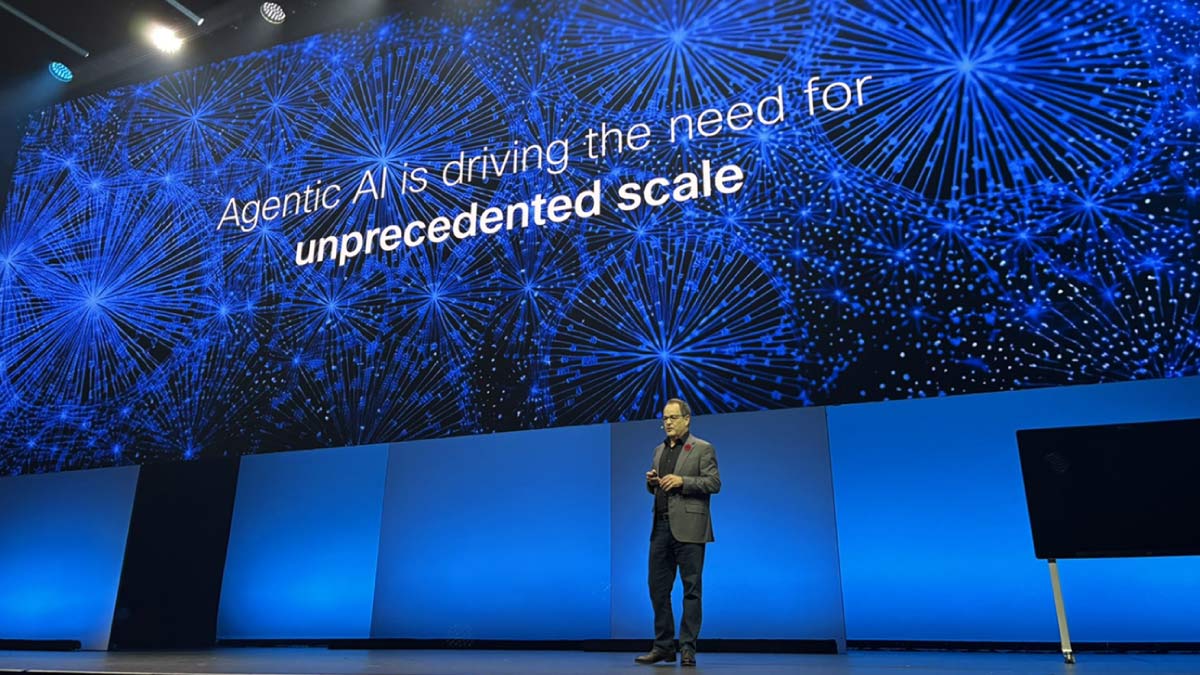Purpose is one of the most important topics in business today. Companies of all sizes are responding to heightened expectations from their stakeholders to help solve the world’s biggest social, economic, and environmental challenges.
For Cisco, that means accelerating its long-held belief that technology, when thoughtfully, strategically, and responsibly applied, can positively impact people, society, and the planet.
“Cisco’s purpose — to power an inclusive future for all — is the company’s strategic and moral compass for our decision-making and actions, including our strategy, investments, and approach to innovation,” said Shari Slate, Cisco’s chief inclusion and collaboration officer and SVP of inclusive future and strategy, at a Cisco Live session she moderated last month with press and analysts.
“The conversation we’re having here at Cisco Live on how purpose is driving our innovation,” Slate continued, “is an example of the conversations we’re having across the company with every business unit as we do the hard work of operationalizing our purpose and embedding it into the company’s DNA.””
Slate was joined at the session by Liz Centoni, Cisco’s chief strategy officer and general manager for applications, and Derek Idemoto, senior vice president, Corporate Development and Cisco Investments.
Centoni explained how purpose informs the most cutting-edge innovations at Cisco.
“We’re looking at how do we use technology to provide the future that we want,” she said, “or maybe even the future that we don’t yet know about. That’s the beauty of it in terms of where you can research and experiment to use our technology for positive impact.”
From Centoni’s perspective, that positive impact extends from networking and security to AI and quantum computing, to name a few of the emerging technologies her team is exploring.
But it also demands vigilance and responsibility. Cisco, for example, is a leader in the ethical use of AI and machine learning.
“If you’re developing AI,” she stressed, “you must be responsible for how the data is collected, how it’s stored, the algorithms that you write, and what insights it’s going to be used for. And so last year as a company, we launched the Responsible AI Framework, focused on how to build transparency, fairness, accountability, privacy, security, and reliability into all the work our teams are doing with AI across our portfolio.”
Investing with a social conscience
Cisco’s purpose also informs its investments in startups, entrepreneurs, and innovation
“In 2020, Cisco established our social justice beliefs and 12 social justice actions with the goal of driving lasting, systemic, and generational change across the full spectrum of diversity,” Slate continued. “Cisco is investing $300 million over five years to drive measurable impact in everything from increasing diverse representation inside of our company through to ensuring our suppliers have diversity embedded in their organizations through to diversifying our partner ecosystem.”
Slate then asked Idemoto to talk about Action 11 – investing in innovation through strategic venture capital – to illustrate Cisco’s purpose-driven investment strategy.
“When we talk about powering an inclusive feature for all,” Idemoto said, “it’s at the core of our mission when we do acquisitions and investments. That means, we bring in companies that are going to support digitization and access for everyone globally. We look at the culture of the companies we’re bringing in and their leadership.”
An example of the company’s purpose-driven investments is its Aspire Fund.
“Cisco Investments has been investing in diversity for years,” said Idemoto. “To accelerate our efforts, as part of our social justice actions, we launched our $50 million Aspire Fund in 2020, which is focused on investments in diverse-led startups and venture funds in the enterprise technology space.”
“We’re making great strides,” Idemoto said. “Since launching the fund, we’ve invested in several diverse-led startups and venture funds led by exceptional Black, Latino, Asian, and female founders and CEOs.”
Purpose, passion, and powerful innovation — where it matters most
In a separate Cisco Live event, Dr. Guy Diedrich spoke of Cisco’s Country Digital Acceleration (CDA) initiative, which he leads in his role as SVP and global innovation officer. CDA brings innovation to bear on a wide range of societal challenges around the world — including opportunity, sustainability, education, healthcare, and so much more. It began seven years with the goal of partnering with governments to speed their digital transformation — and help their people in new ways.
“Today, we’re in 44 countries around the world,” Diedrich said. “We have completed over 1,200 individual digitization projects, and these are projects that span every vertical imaginable from healthcare to education, to security, to smart and connected stadiums, transportation, smart cities, and the list goes on.”
The digital divide is of paramount importance to CDA. And Diedrich was particularly impassioned on the impact that this will have on the world. From Cisco’s perspective, by denying internet access to 50 percent of the world’s population, we are denying fundamental human rights.
But Diedrich stressed that beyond the moral imperative, the additional benefits to connecting those billions of people are massive.
“If we connect that 50 percent in a meaningful way to the internet,” Diedrich added, “we will instantly lift 500 million people out of abject poverty, 500 million people that will be given opportunities that they don't have now. And it’s not just the right thing to do. It's also going to contribute $6.7 trillion dollars to global GDP. So, it’s the right thing to do. It’s the moral and ethical thing to do, but it is also the economically prudent thing to do.”
That, however, demands a rethinking of the economics of the internet itself. And Jonathan Davidson, EVP and general manager of Cisco’s mass-scale infrastructure group, explained how innovations like routed optical networking are making networking cheaper, simpler to deploy, and less energy hungry — all with great improvements in speed, bandwidth, and latency.
“We must change the economics of the internet,” Davidson said, “This is our motivation to reinvent the internet for the future. Cisco, Cisco advancements in silicon, optics, software, and systems are transformational and allow us to redefine the internet architecture and redefine economics.”
It all comes back to purpose, as Cisco CEO Chuck Robbins concluded in a Cisco Live keynote address.
“We believe that our technology is at the core of connecting people all around the world,” Robbins said, “connecting people in rural villages, connecting people that have been left behind so that we can provide education, provide healthcare, provide opportunity and provide jobs. These are the things that are most important to us.”
###




